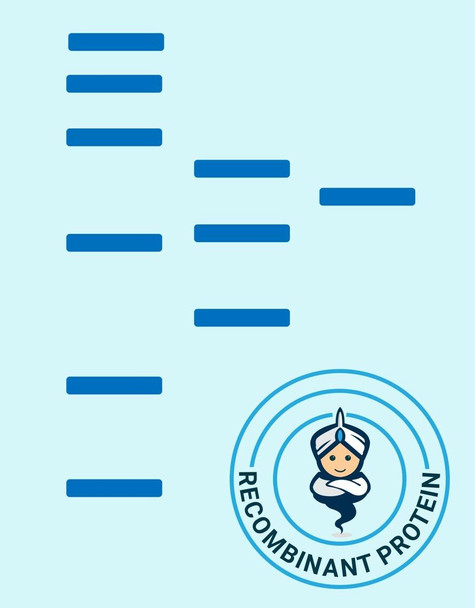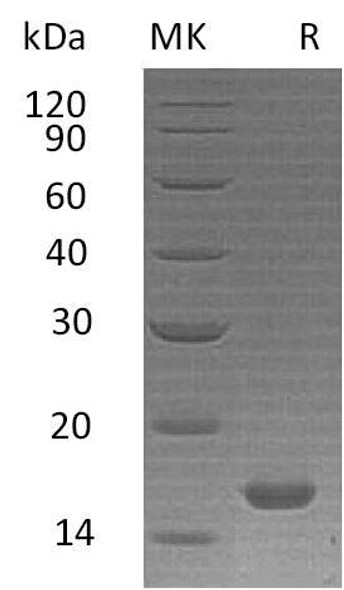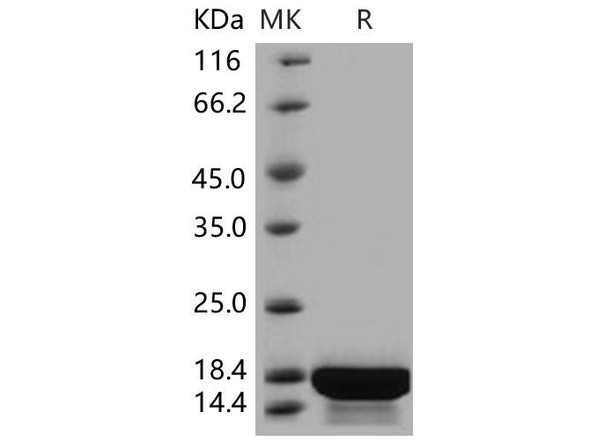Description
| Product Name: | Human IL 21 Recombinant Protein |
| Product Code: | RPPB0632 |
| Size: | 10µg |
| Species: | Human |
| Target: | IL 21 |
| Synonyms: | Za11, IL-21. |
| Source: | Escherichia Coli |
| Physical Appearance: | Sterile Filtered White lyophilized (freeze-dried) powder. |
| Formulation: | Lyophilized from PBS, pH 7.4. |
| Solubility: | It is recommended to reconstitute the lyophilized Interleukin -21 in sterile 18M?-cm H2O not less than 100�g/ml, which can then be further diluted to other aqueous solutions. |
| Stability: | Lyophilized Interleukin-21 although stable at room temperature for 3 weeks, should be stored desiccated below -18°C. Upon reconstitution IL21 should be stored at 4°C between 2-7 days and for future use below -18°C.For long term storage it is recommended to add a carrier protein (0.1% HSA or BSA).Please prevent freeze-thaw cycles. |
| Purity: | Greater than 97.0% as determined by SDS-PAGE. |
| Amino Acid Sequence: | MQDRHMIRMR QLIDIVDQLK NYVNDLVPEF LPAPEDVETN CEWSAFSCFQ KAQLKSANTG NNERIINVSI KKLKRKPPST NAGRRQKHRL TCPSCDSYEK KPPKEFLERF KSLLQKMIHQ HLSSRTHGSE DS |
| Biological Activity: | Measured by its ability to proliferate activated B cells. |
IL-21 is produced by CD4+ T cells in response to antigenic stimulation. Its action enhances antigen-specific responses of immune cells. The biological effects of IL-21 include induction of differentiation of T-cells-stimulated B-cells into plasma cells and memory B-cells, stimulation (in conjuction) with IL-4 of IgG production, and induction of apoptotic effects in naive B-cells and stimulated B-cells in the absence of T-cell signaling. Additionally, IL-21 promotes the anti-tumor activity of CD8+ T-cells and NK cells. IL-21 exerts its effect through binding to a specific type I cytokine receptor, IL-21R, which also contains the gamma chain (�C) found in other cytokine receptors including IL-2, IL-4, IL-7, IL-9 and IL-15. The IL-21/IL-21R interaction triggers a cascade of events which includes activation of the tyrosine kinases JAK1 and JAK3, followed by activation of the transcription factors STAT1 and STAT3.
IL21 Human Recombinant produced in E.Coli is a single, non-glycosylated polypeptide chain containing 132 amino acids and having a total molecular mass of 15.4kDa. The IL-21 is purified by proprietary chromatographic techniques.
| UniProt Protein Function: | IL21: Cytokine with immunoregulatory activity. May promote the transition between innate and adaptive immunity. Induces the production of IgG(1) and IgG(3) in B-cells. May play a role in proliferation and maturation of natural killer (NK) cells in synergy with IL15. May regulate proliferation of mature B- and T-cells in response to activating stimuli. In synergy with IL15 and IL18 stimulates interferon gamma production in T-cells and NK cells. During T-cell mediated immune response may inhibit dendritic cells (DC) activation and maturation. Belongs to the IL-15/IL-21 family. 2 isoforms of the human protein are produced by alternative splicing. |
| UniProt Protein Details: | Protein type:Cytokine; Apoptosis; Secreted, signal peptide; Secreted; Cell development/differentiation Chromosomal Location of Human Ortholog: 4q26-q27 Molecular Function:hematopoietin/interferon-class (D200-domain) cytokine receptor binding; interleukin-2 receptor binding Biological Process: cell maturation; positive regulation of B cell proliferation; positive regulation of cell proliferation; positive regulation of cytokine production; positive regulation of inflammatory response; positive regulation of interleukin-17 production; positive regulation of natural killer cell mediated cytotoxicity; positive regulation of T cell proliferation; positive regulation of tissue remodeling; positive regulation of tyrosine phosphorylation of Stat1 protein; positive regulation of tyrosine phosphorylation of Stat3 protein; tyrosine phosphorylation of Stat3 protein Disease: Immunodeficiency, Common Variable, 11 |
| NCBI Summary: | This gene encodes a member of the common-gamma chain family of cytokines with immunoregulatory activity. The encoded protein plays a role in both the innate and adaptive immune responses by inducing the differentiation, proliferation and activity of multiple target cells including macrophages, natural killer cells, B cells and cytotoxic T cells. Dysregulation of this gene plays a role in multiple immune-mediated diseases including lupus, psoriasis and chronic inflammatory diseases. Alternatively spliced transcript variants encoding multiple isoforms have been observed for this gene. [provided by RefSeq, Dec 2011] |
| UniProt Code: | Q9HBE4 |
| NCBI GenInfo Identifier: | 55976599 |
| NCBI Gene ID: | 59067 |
| NCBI Accession: | Q9HBE4.2 |
| UniProt Secondary Accession: | Q9HBE4,A5J0L4, |
| UniProt Related Accession: | Q9HBE4 |
| Molecular Weight: | 16,867 Da |
| NCBI Full Name: | Interleukin-21 |
| NCBI Synonym Full Names: | interleukin 21 |
| NCBI Official Symbol: | IL21�� |
| NCBI Official Synonym Symbols: | Za11; IL-21; CVID11�� |
| NCBI Protein Information: | interleukin-21 |
| UniProt Protein Name: | Interleukin-21 |
| UniProt Synonym Protein Names: | Za11 |
| Protein Family: | Interleukin |
| UniProt Gene Name: | IL21�� |
| UniProt Entry Name: | IL21_HUMAN |









